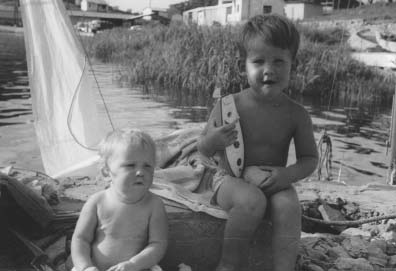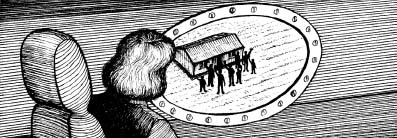Read Roses Under the Miombo Trees Online
Authors: Amanda Parkyn
Roses Under the Miombo Trees (26 page)
My mention of the âmozzies' and of sleeping nets down at lake level reminds me of a recent (2009) TV documentary, âGuns, Germs and Steel', which showed the ravages wrought by malaria today. The example given was Zambia, showing the children's ward of Lusaka's main hospital, full of babies and children lying listless and clearly desperately ill. The presenter's doctor guide explains how malaria is ravaging the population, especially the young, now concentrated overwhelmingly in crowded urban areas. Yet I don't recall our worrying about the risk. Perhaps those whose work took them to lower altitudes and steamier heat were more likely to get it, for occasionally one heard of someone who had âhad a bad go' of it. We certainly took no prophylactics. Yet today malaria is one of the great scourges of tropical and sub-tropical Africa. Indeed 90% of malaria-related deaths are in sub-Saharan Africa, the majority of them among children under 5 years old. The parasites have become increasingly resistant to the main drugs used, and HIV infection increases individuals' susceptibility.
However, there is good news too: in April 2009 the United Nations news service announced that Zambia had joined several other African countries in slashing the number of deaths from malaria by more than half, through aggressive control measures. Between 2006 and 2008, 3.6 million long-lasting insecticidal [bed] nets were handed out, coinciding with a 47% decline in malaria deaths in the same period. The prevalence in parasites dropped too by 53%, and the percentage of children with severe anaemia â mostly caused by malaria â fell by 68%.
âZambia stands as an example of what we can achieve throughout Africa through the combination of universal access to bed nets and effective malaria medicines', said the World Health Organisation.

It was now October, our âpigeon pair' developing fast, Paul stringing words together at last (âlookadat!' was a first), Caroline over the worst of her digestive problems. I delighted in their difference: Paul so sturdy, strong and a real boy, Caroline small-boned and delicate, yet wiry and full of energy. She was variously described in letters to her grandparents as âhaving a fearful temper but with a naughty sense of humour' (me) and âa menace' (her doting father). This last was for her habit of waking the household at 5.30 a.m. and, at 8½ months, of spurning crawling in favour of standing upright like everyone else. This involved steadying herself determinedly on the furniture or, preferably, on Mum's legs, plus a great deal of falling over. She and Paul were good mates now, to my great delight, giggling together over toys, in the bath and side by side in two high chairs in the kitchen, where they swapped finger food and Paul ate heartily, his sister little. We took the plunge and put her into Paul's bedroom, where he was quite prepared to entertain her for an hour till we got up. The pleasure of remembering these scenes reminds me of how hard it must have been for their grandparents, with only my letters and occasional tiny photos to keep them going. Already, though, I was writing home about the possibilities for our long leave the following year, and how we were saving for the airfares home.

Our pigeon pair

...and feeling hot down at Mpulungu
Soon, in the final run-up to Independence, came another ball, and so another cabaret: this time to welcome visiting golfers for the Abercorn Open weekend, in which Mark, the club committee's golf member, was much involved. The theme was âCaribbean' (sort of), the cabaret a series of musical(ish) numbers. Somewhere in the planning stage, when talents were being trawled from reluctant members, I admitted to playing the clarinet, which had lain untouched in a trunk since I had left home nearly five years before. Suddenly I was committed to playing in a small group, bizarrely named the Chila Chits, with Gavin Barr on guitar, Nobby Clark on banjo and Alan on tea chest bass. My repertoire was strictly classical, my comfort zone Bach rather than Bacharach, a sonatina sooner than swing, all played from sheet music. Now I must pick out a tune and play it from memory, with the gallant support and encouragement of the âstring section'. I recall wishing that I could âswing it', improvise, jazz it up, and finding that it was just out of my reach. I could however play in tune with a decent tone, (much to Mark's astonishment, for it turned out that he had never heard me play). After much practising, I could manage âMoon River', âString of Pearls' and âThe Girl from Ipanema', moving on to include âIn the Mood', âBye Bye Blues' and we reached a triumphant climax with âWhen the Saints Come Marching In'. The week before the ball, I wrote home with studied understatement of having too much to do:
The Ball is on Saturday, Ian Mackinson is giving drinks before it and I am making food for him
, [Barbara had gone ahead to UK]
and we are rehearsing nightly for the cabaret. On Sunday I am helping to do a buffet lunch for 50 at the club, making fruit flans, ham and several salads. The Open golf is over Sat. and Sun. and we are also having Jo Martin from Kasama for the w/e, a nice girl and the only eligible one for miles, so she'll be popular! I am trying to knock up a tropical dress, a one-shoulder drape in native cloth, and a cummerbund for Mark. â Now Mark has just been in with 2 VIP's from Salisbury he is entertaining, for coffee, and has now rushed to Kasama for the day with them, then Colin Carlin appeared for coffee and discussion on the dance â no wonder I never get everything done! Later I am going to Jiff to rig up dresses
.
As
Abercornucopia
reported, on the night the Chila Chits, introduced by Ian our MC, were proclaimed a hit, as were ballads sung by Kevin Gould and Joan Carlin, Gavin's golf calypso and various mime-to-recordings numbers. Jo had brought with her another single girl, from V.S.O.:
the two girls had a terrific time with about ten bachelors between them. We danced madly till 1.30 a.m. and then to bed exhausted. Ian taped all the music which was v. good. On Sun. p.m. after working all morning on the buffet, I had super sailing while the golfers golfed. Won a thrilling race after a nasty pile-up at No. 3 Buoy where the leading boat capsized in a gale and we came up behind â as we went about my crew was warding off masts and booms with both hands! I then presented the golf prizes, having got the tinies to bed in the car early, and Mark made a v. good speech, but by 9.30 I was expiring of exhaustion.
I never got to hear the tape recording Ian made of our group, to take to my parents when he returned to England, and perhaps it is just as well it has long since been lost.
Â
Ode to My Merry Widow
Everybody had one â we believed
in its magic, the way it pushed
our breasts to pin-up proportions, and down
the front, over the fierce metal zip, the tiny
hooks and eyes we linked and linked
till voilà ! â a neat wasp waist above
the swing of frilled suspenders.
My black lace merry widow,
where are you now? Is some young body
still prepared to bear the pinch and prod
of your wires and metal fixings? More likely
you went to landfill, lacy nylon dissolving
amidst cans and cartons, your metal ribs
still lying, skeletal, in the sand.
Flags exchanged at midnight: of dreaded
farewells and a longed-for arrival

People are getting rather apprehensive about Independence
, I wrote in mid-October 1964,
though I don't feel they'll really bother to make trouble.
It was, both Mark and I felt, all somewhat of a formality, but for those settlers who had lived in the country for decades, perhaps their whole lives, it was much harder to come to terms with. And for the careers of those Britons who had worked for the Northern Rhodesia Government, there were step changes ahead, if not already faced. Nonetheless, the Union flag would be coming down for the last time:
We want to go to the flag lowering and raising etc. in the township at midnight on 23
rd
, but not if it means standing pressed in a sweaty throng. Pam [our neighbour] may baby-sit for us, we can't take children in the car down there
.
Abercornucopia
published a full centre page spread of the forthcoming independence weekend celebrations programme. It would begin during Friday with âarrival of people from rural areas', then an evening torchlight procession through the township to the Independence Ground was to be followed by âtraditional dances and songs, a parade of Messengers, Kapasus, Youth league and prayers for the new nation', before the midnight flag lowering and raising ceremony. Saturday would start with prayers and services at St Francis Mission and the church, a gathering with the Tanganyika Brass Band would be followed by the reading of the new president's message, the firing of rockets and a flypast of Red Locust Control aircraft dropping Zambian flags. Then a parade, cycle races, football matches, a cocktail party at the District Secretary's residence (âby invitation'), a cinema show and open air concert and dancing from 9 p.m. Sunday would be quieter: more services of worship followed by inter-schools sports and football, closing with ballroom dancing at the Catholic Welfare Hall and traditional dancing at Independence Ground.
While all this was going on, Abercorn would also be making a unique contribution to the national celebrations, as our newspaper headlined. Following a precedent set by Kenya and neighbouring Tanganyika and Malawi, the new flag was to be raised at midnight on the country's highest (6,782 ft) peak, Mount Sunzu, 21 miles away by road and close to the border with Tanganyika. This âstrenuous expedition',
Abercornucopia
reported, would be undertaken by the training staff at Abercorn's Outward Bound School, adding: âA fine view of the table-like summit about 17 miles away is gained from Abercorn airport, and it can be seen from many villages in the surrounding countryside; but in general the country is thinly populated by not very advanced people who will probably be somewhat puzzled by this unusual light high on their night-time horizon.'
In the run-up to the weekend I wrote home:
The town is decked in Zambian flags (so ugly â black, red, green, orange) processions rehearsing etc. Jiff and Alan are coming to supper and bridge on Friday and we all go to Independence Ground at 10.30 p.m. or so. There is a Tanganyika brass band, and fortunately places in an enclosure for 2/- to avoid being trampled! ⦠As we have to give the servants most of the w/e off we shall be busy watering flowers and veg. We haven't any fixtures at the Club â some people are fearfully anti and won't go to the ceremony or anything, but it seems silly as the Union Jack only represents what went a while ago now
.

